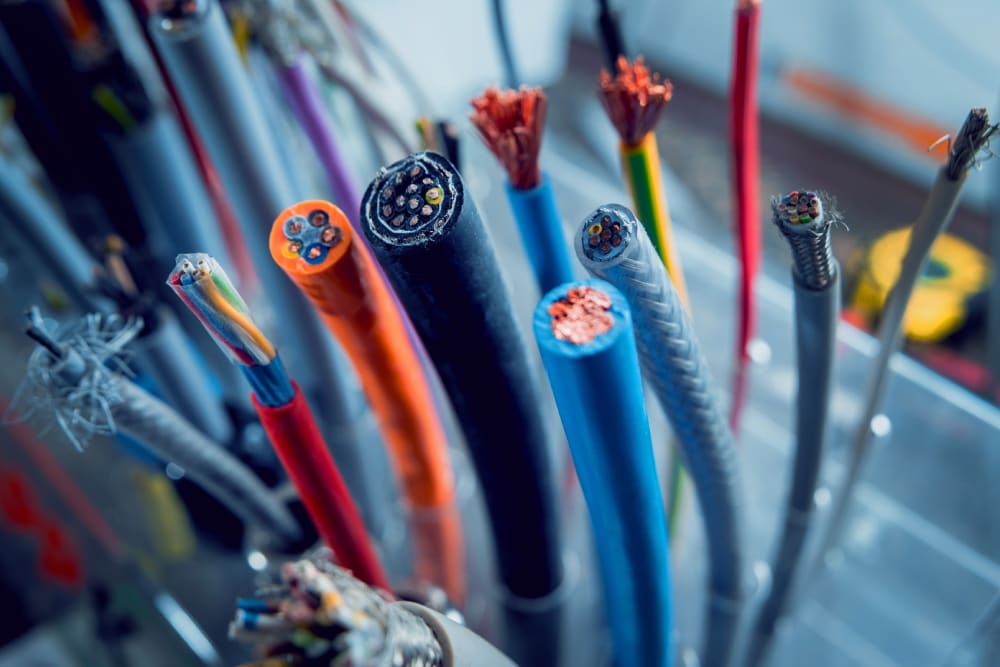- Published Jan 24, 2024
- Last Modified Jan 24, 2024
- 5 min
Why Choosing the Right Type of Cable Matters in the Age of IoT
Looking to adopt smart manufacturing? Learn how to choose the right type of cables to help you leverage the full potential of IoT now with RS Components.

The rise of the Internet of Things (IoT) has marked a new chapter of technological advancement and heightened productivity, with the manufacturing sector as one of its biggest beneficiaries. From managing production assets and maintenance to providing remote assistance and field services, IoT technology is a key driver in helping manufacturing companies achieve more with less.
At the heart of this transformation are cables, which have become a vital component enabling this transition towards smart manufacturing and industrial automation.

How Do Cables Affect IoT Communication and Industrial Automation?
With the help of cables, seamless communication between IoT components is achieved, allowing manufacturers to improve production processes while reducing operational costs and downtime. However, with different applications requiring different cables, knowing how to select the correct cable type has become imperative to enable firms to leverage the full potential of IoT.
1. Supporting Industrial Automation Systems
For instance, having the right type of cable ensures reliable data transmission between IoT devices and sensors so manufacturers can improve production efficiency and quality.
2. Proactive Maintenance
As your IoT-connected machines monitor diverse parameters from temperature to pressure, keeping them running properly with the right type of cable enables proactive problem detection and correction. This, consequently, minimizes downtime to increase productivity and reduce operational costs.
3. Improving Adaptability
When production demands fluctuate, industrial automation systems may require frequent reconfiguration or relocation to meet the changing needs. The right cables that offer high flexibility and bending resistance can ensure that your company remains adaptable without compromising production quality.
4. Enhancing Safety
In industrial environments, using the right type of cable also reduces the likelihood of accidents. A case in point is when fire-resistant cables are used in facilities that deal with flammable products. In doing so, manufacturers can minimize hazards, protecting employees while ensuring compliance with regulatory requirements.
How to Pick Cables for Your IoT Infrastructure

With an understanding of the importance of cables in supporting IoT implementation, how then do you choose one for your application? It begins with first understanding the properties of each type of cable:
1. Ethernet Cables
Ethernet cables, particularly Category 6 (Cat 6) and Category 6a (Cat 6a), stand out for their ability to transmit data at high speeds and resilience against signal interference. Compatible with previous Ethernet standards, they can be used flexibly for various setups. If you seek to connect IoT devices to local networks, routers, and switches, Cat 6 and Cat 6a Ethernet cables, like what RS Components offers, are ideal for ensuring stable, reliable connections.
2. Industrial Ethernet Cables
For IoT environments with more demanding conditions, Industrial Ethernet cables, such as Cat 6A F/UTP (Foiled/Unshielded Twisted Pair) and Cat 7 S/FTP (Shielded/Foiled Twisted Pair), are preferred. These cables can withstand mechanical stress and harsh conditions, making them more durable while offering enhanced resistance to electromagnetic (EMI) and radio frequency interference (RFI).
3. Fiber Optic Cables
Fiber optic cables, on the other hand, excel in environments where long-distance data transmission is essential and where EMI must be minimized. With high bandwidth capacity, low signal loss, and enhanced data security features, they are perfect for connecting remote devices or interlinking multiple IoT networks over large distances.
4. Shielded Cables
Besides the options above, shielded cables can also be used in environments where EMI is prevalent. Options like Shielded Twisted Pair (STP) or FTP cables can guard against EMI/RFI, mitigating signal deterioration and boosting the reliability of the IoT network.
5. Power and Data Combination Cables
If your IoT devices need both a stable connection and a power supply, hybrid cables are particularly beneficial. When used in remote sensor deployments or IoT-powered surveillance systems, the dual functionality of these cables is practical and simplifies cable management.
5. Multi-Conductor Cables
Meanwhile, in cases where linking several sensors or devices to a central control unit in an IoT setup is required, multi-conductor cables are preferred. This type of cable, which contains several insulated conductors encased within an outer jacket, offers a streamlined solution for organizing and handling multiple connections within an IoT network.
7. DisplayPort Cables
For high-definition audio and video transmission, go for DisplayPort cables, which can be used to connect industrial and embedded computer systems to high-resolution displays. This capability makes them useful for diagnostics and monitoring complex system processes.
Embrace IoT with RS Components
As IoT becomes the next industry standard, ensuring seamless communication between your devices is essential for maintaining business competitiveness. The right infrastructure, starting with selecting appropriate cables, lays the foundation for a successful IoT implementation, and RS Components can be your reliable partner in creating this setup.
Offering a wide range of high-quality cable wires, from Ethernet to fiber optic cables, you can find the right component to meet your varied needs. Understanding that the IoT journey encompasses more than just cables, we also offer vital accessories like basic hand tools, ensuring a safe and efficient setup for your IoT applications. Browse cables and more today to lay a solid groundwork for your IoT implementation.
Popular Cable Brands
TE Connectivity
TE Connectivity's cables are renowned for their superior quality and reliability, designed to meet diverse and demanding connectivity needs.
Related links
- How To Choose The Right Type of Gloves?
- A Complete Guide to Chisels
- Everything You Need to Know About Coaxial Connectors
- The Future of Robotics and Automation in the Philippines
- Selecting the Best Twist Drill Bits for Every Project
- Smart Solutions for Food & Drink Manufacturing
- A Guide to the Different Types of Wrenches
- A Complete Guide to Work Gloves & Hand Protection